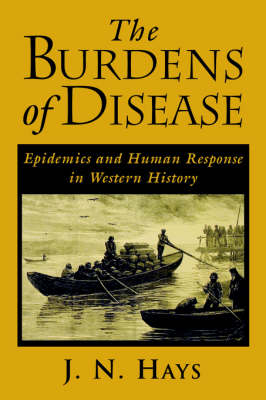
The Burdens of Disease
Epidemics and Human Response in Western History
Seiten
1998
Rutgers University Press (Verlag)
978-0-8135-2528-0 (ISBN)
Rutgers University Press (Verlag)
978-0-8135-2528-0 (ISBN)
- Titel ist leider vergriffen;
keine Neuauflage - Artikel merken
In this approach to the history of disease, J.N. Hays chronicles perceptions and responses to plague and pestilence over 2000 years of western history. Hays frames disease as a multi-dimensional construct, situated at the intersection of history, politics, culture and medicine.
In this sweeping approach to the history of disease, historian J. N. Hays chronicles perceptions and responses to plague and pestilence over two thousand years of Western history. Hays frames disease as a multidimensional construct, situated at the intersection of history, politics, culture, and medicine, and rooted in mentalities and social relations as much as in biological conditions of pathology. He shows how diseases affect social and political change, reveal social tensions, and are mediated both within and outside the realm of scientific medicine. Beginning with the legacy of Greek, Roman, and early Christian ideas about disease, the book then discusses many of the dramatic epidemics from the fourteenth through the twentieth centuries, moving from leprosy and bubonic plague through syphilis, smallpox, cholera, tuberculosis, influenza, and poliomyelitis to AIDS. Hays examines the devastating exchange of diseases between cultures and continents that ensued during the age of exploration. He also describes disease through the lenses of medical theory, public health, folk traditions, and government response. The history of epidemics is also the history of their victims.
Hays pays close attention to the relationships between poverty and power and disease, using contemporary case studies to support his argument that diseases concentrate their pathological effects on the poor, while elites associate the cause of disease with the culture and habits of the poor. J. N. Hays is a professor of history at Loyola University of Chicago. "Hays has written a remarkable book...It should be in every undergraduate library and be recommended reading, as a whole or in part, in a wide range of history of medicine courses."--Isis "Required reading for any university-level course on the social history of medicine and, indeed, of medicine generally...A masterly and reliable synthesis."--American Historical Review "This is an impressive piece of work...A fine and focused overview of a significant range of topics in the history of medicine."--M. Jeanne Peterson, Indiana University
In this sweeping approach to the history of disease, historian J. N. Hays chronicles perceptions and responses to plague and pestilence over two thousand years of Western history. Hays frames disease as a multidimensional construct, situated at the intersection of history, politics, culture, and medicine, and rooted in mentalities and social relations as much as in biological conditions of pathology. He shows how diseases affect social and political change, reveal social tensions, and are mediated both within and outside the realm of scientific medicine. Beginning with the legacy of Greek, Roman, and early Christian ideas about disease, the book then discusses many of the dramatic epidemics from the fourteenth through the twentieth centuries, moving from leprosy and bubonic plague through syphilis, smallpox, cholera, tuberculosis, influenza, and poliomyelitis to AIDS. Hays examines the devastating exchange of diseases between cultures and continents that ensued during the age of exploration. He also describes disease through the lenses of medical theory, public health, folk traditions, and government response. The history of epidemics is also the history of their victims.
Hays pays close attention to the relationships between poverty and power and disease, using contemporary case studies to support his argument that diseases concentrate their pathological effects on the poor, while elites associate the cause of disease with the culture and habits of the poor. J. N. Hays is a professor of history at Loyola University of Chicago. "Hays has written a remarkable book...It should be in every undergraduate library and be recommended reading, as a whole or in part, in a wide range of history of medicine courses."--Isis "Required reading for any university-level course on the social history of medicine and, indeed, of medicine generally...A masterly and reliable synthesis."--American Historical Review "This is an impressive piece of work...A fine and focused overview of a significant range of topics in the history of medicine."--M. Jeanne Peterson, Indiana University
J. N. HAYS is associate professor of history at Loyola University of Chicago.
| Erscheint lt. Verlag | 30.9.1998 |
|---|---|
| Zusatzinfo | black & white illustrations |
| Verlagsort | New Brunswick, NJ |
| Sprache | englisch |
| Maße | 156 x 234 mm |
| Gewicht | 532 g |
| Themenwelt | Geschichte ► Teilgebiete der Geschichte ► Kulturgeschichte |
| Studium ► Querschnittsbereiche ► Epidemiologie / Med. Biometrie | |
| Studium ► Querschnittsbereiche ► Geschichte / Ethik der Medizin | |
| Naturwissenschaften ► Biologie ► Humanbiologie | |
| Sozialwissenschaften ► Ethnologie | |
| ISBN-10 | 0-8135-2528-4 / 0813525284 |
| ISBN-13 | 978-0-8135-2528-0 / 9780813525280 |
| Zustand | Neuware |
| Haben Sie eine Frage zum Produkt? |
Mehr entdecken
aus dem Bereich
aus dem Bereich
der stille Abschied vom bäuerlichen Leben in Deutschland
Buch | Hardcover (2023)
C.H.Beck (Verlag)
CHF 32,15
vom Mittelalter bis zur Gegenwart
Buch | Softcover (2024)
C.H.Beck (Verlag)
CHF 16,80


